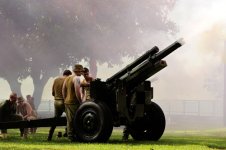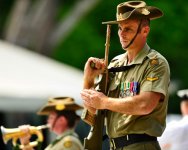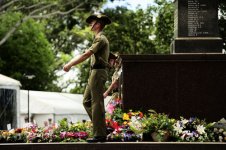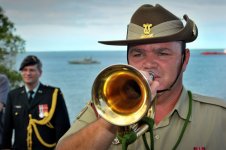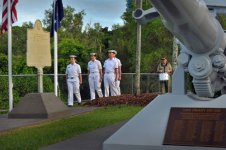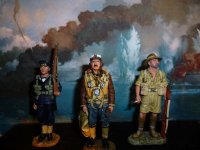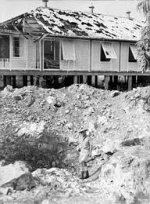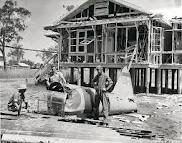TomNT
Lieutenant Colonel
- Joined
- May 7, 2011
- Messages
- 7,986
Hi Fellas
Sorry I am late with this post, I have been flat chat like a lizard drinking!! Here is a bit of info on the first raids on Darwin and the subsequent raids that followed until the 12th of November 1943. I have included some pic's from the anniversary yesterday as well as a link to a short video showing war time film, photo's and interviews with diggers and people that were in Darwin at the time.
Darwin, the largest population centre in northern Australia, was considered a vital asset in Australia's defences against an increasingly aggressive Japanese Empire in the 1930s. Its port and airfield facilities were developed, coastal defence batteries constructed and its garrison steadily enlarged. The outbreak of war in the Pacific resulted in the rapid enlargement of the military presence in Darwin and it was used as a base from which to deploy forces for the defence of the Dutch East Indies. In January and February these forces were overwhelmed by Japanese landings, usually preceded by heavy air attacks.
On 19 February 1942 Darwin itself was bombed. Japanese fighters and bombers attacked the port and shipping in the harbour twice during the day, killing 252 Allied service personnel and civilians. On 3 March Broome, in Western Australia, was strafed. In succeeding months air attacks were made on many towns in northern Australia including Wyndham, Port Hedland and Derby in Western Australia, Darwin and Katherine in the Northern Territory, Townsville and Mossman in Queensland, and Horn Island in the Torres Strait. Despite popular fears these raids were not the precursor to an invasion but they did serve to interrupt the use of Darwin's port facilities. The raids also tied up anti aircraft defences and air force units that would have otherwise been sent to more forward areas.
The Japanese air raids on Darwin on 19 February involved, collectively, over 260 enemy aircraft. Subsequent raids in April, June, July and November 1942, and March 1943 were carried out with forces of 30 to 40 fighters and bombers. Between the large raids there were smaller operations by groups of under a dozen Japanese aircraft. Most of the raids occurred in daylight but there were some small scale night attacks.
The 64th, and last, air raid on Darwin occurred on 12 November 1943. In total there were 97 air attacks on northern Australia and enemy air reconnaissance over the region continued through much of 1944.
http://www.ntnews.com.au/article/2012/02/19/289455_ntnews.html
Sorry I am late with this post, I have been flat chat like a lizard drinking!! Here is a bit of info on the first raids on Darwin and the subsequent raids that followed until the 12th of November 1943. I have included some pic's from the anniversary yesterday as well as a link to a short video showing war time film, photo's and interviews with diggers and people that were in Darwin at the time.
Darwin, the largest population centre in northern Australia, was considered a vital asset in Australia's defences against an increasingly aggressive Japanese Empire in the 1930s. Its port and airfield facilities were developed, coastal defence batteries constructed and its garrison steadily enlarged. The outbreak of war in the Pacific resulted in the rapid enlargement of the military presence in Darwin and it was used as a base from which to deploy forces for the defence of the Dutch East Indies. In January and February these forces were overwhelmed by Japanese landings, usually preceded by heavy air attacks.
On 19 February 1942 Darwin itself was bombed. Japanese fighters and bombers attacked the port and shipping in the harbour twice during the day, killing 252 Allied service personnel and civilians. On 3 March Broome, in Western Australia, was strafed. In succeeding months air attacks were made on many towns in northern Australia including Wyndham, Port Hedland and Derby in Western Australia, Darwin and Katherine in the Northern Territory, Townsville and Mossman in Queensland, and Horn Island in the Torres Strait. Despite popular fears these raids were not the precursor to an invasion but they did serve to interrupt the use of Darwin's port facilities. The raids also tied up anti aircraft defences and air force units that would have otherwise been sent to more forward areas.
The Japanese air raids on Darwin on 19 February involved, collectively, over 260 enemy aircraft. Subsequent raids in April, June, July and November 1942, and March 1943 were carried out with forces of 30 to 40 fighters and bombers. Between the large raids there were smaller operations by groups of under a dozen Japanese aircraft. Most of the raids occurred in daylight but there were some small scale night attacks.
The 64th, and last, air raid on Darwin occurred on 12 November 1943. In total there were 97 air attacks on northern Australia and enemy air reconnaissance over the region continued through much of 1944.
http://www.ntnews.com.au/article/2012/02/19/289455_ntnews.html


